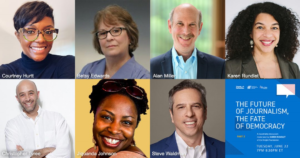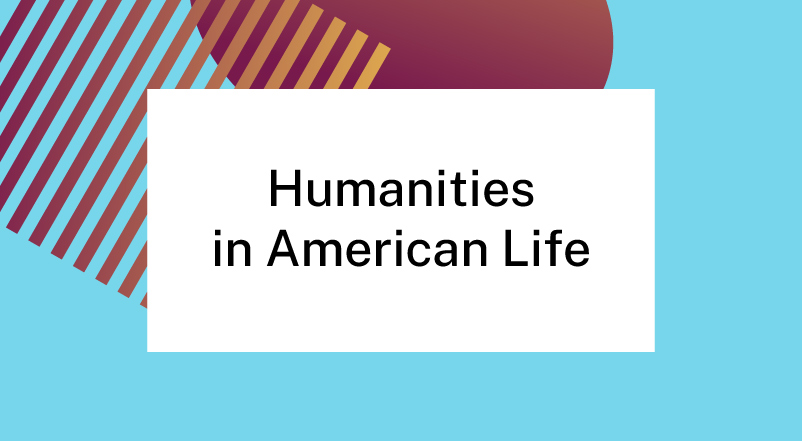“The Future of Journalism, the Fate of Democracy” with Virginia Humanities
by Sydney Boyd, editor and content producer
 “In Virginia alone, we lost 39 weekly newspapers between 2004 and 2020 and three dailies, a 27% decrease in news publications statewide,” said Matthew Gibson, executive director of Virginia Humanities, as he introduced the first of a two-part series of conversations on June 8 titled “The Future of Journalism, the Fate of Democracy.” A Virginia Humanities program, the series drew registrations from 45 different US states and territories and is part of the “Democracy and the Informed Citizen” initiative, administered by the Federation of State Humanities Councils and funded by The Andrew W. Mellon Foundation.
“In Virginia alone, we lost 39 weekly newspapers between 2004 and 2020 and three dailies, a 27% decrease in news publications statewide,” said Matthew Gibson, executive director of Virginia Humanities, as he introduced the first of a two-part series of conversations on June 8 titled “The Future of Journalism, the Fate of Democracy.” A Virginia Humanities program, the series drew registrations from 45 different US states and territories and is part of the “Democracy and the Informed Citizen” initiative, administered by the Federation of State Humanities Councils and funded by The Andrew W. Mellon Foundation.
Moderated by Phoebe Stein, president of the Federation of State Humanities Councils, Part One of the series focused on the civics, histories, and cultures of local newspapers and comprised a panel of leading national experts: Penny Abernathy, visiting professor at Medill School of Journalism, Northwestern University; Greg Moore, partner and editor-in-chief of Deke Digital; Karen Rundlet, director of the Journalism Program at the Knight Foundation; and Margaret Sullivan, media columnist for The Washington Post.
Stein opened the conversation by asking Rundlet about what it takes to foster an informed and engaged community.
“We have seen what’s happened when communities are misinformed, uninformed, we know that it can be a life or death situation in terms of the pandemic,” Rundlet said and explained that in 2019, the Knight Foundation decided to invest $300 million into local news because that’s where they saw the opportunity to create an informed citizenry. “There’s so much research that shows that people still trust local news organizations… and there are an increasing number of news deserts across the country, and we’re concerned about that—if people aren’t informed and engaged, what an effect that has on democracy.”
The discussion moved from examining the causes and effects of the for-profit news collapse to building safeguards to maintain objectivity as profit margins and newsrooms shrink and funding sources shift.
“Journalists like to compete against each other, not collaborate with each other,” Sullivan said. “We really need to think about things differently—not always competing, but getting together.”
We still need to train journalists to be entrepreneurial and flexible, panelists noted, but we also need to teach them how to understand alternative business models.
“You go into journalism because of some sort of mission or passion,” Abernathy said. “And what we’ve had to struggle with, and what we didn’t have to think about when I became a journalist, was how the money was made, we just had to argue that we deserved a part of that money to go cover the news.”
When Stein raised the question of citizen journalism’s relationship to conspiracy theories and the tension between a participatory and a collaborative news model, Moore responded that funding is essential to journalism on the very basic level of obtaining information.
“You have to be able, as a news organization, to go up against a government or go up against a private entity that doesn’t want you to have that information, and you have to have the ability to go to court to fight for it,” Moore said. Citing the recent ProPublica article “The Secret IRS Files: Trove of Never-Before-Seen Records Reveal How the Wealthiest Avoid Income Tax,” Moore continued: “There’s no citizen journalist out there that can do that. It takes a properly-resourced, well-trained, fact-checking, reportorial operation to produce that kind of high impact journalism.”
In the second part of the series on June 22, panelists continued to press on questions of funding in a developing journalistic landscape. Rundlet returned to moderate the conversation with Betsy Edwards, executive director of the Virginia Press Association; Courtney Hurtt, program manager of NewsMatch at Institute for Nonprofit News; Jiquanda Johnson, founder and editor of Flint Beat; Alan Miller, founder and CEO of the News Literacy Project; Christopher Tyree, executive director of the Virginia Center for Investigative Journalism; and Steve Waldman, president and co-founder of Report for America.
Johnson founded Flint Beat, a hyperlocal news site, after she began to identify news gaps as a writer in a town she had lived in her whole life. Soon she had more than 40 story ideas written down.
“One day I just wrote my resignation on the back of an agenda during a meeting, and I just decided to leave, not as an entrepreneur or a business person, but as a journalist,” Johnson said about taking the leap to found Flint Beat.
Johnson said she was the only one working at Flint Beat up until last year when she received funding to hire three full-time reporters. Looking ahead, Johnson is working to expand their coverage of local government and public health to economic development and the non-profit sector.
Panelists examined not only how to create but also to restore independent news media outlets, which includes getting the right reporters into newsrooms to report on under-covered topics. Waldman, who noted that Report for America has placed 300 reporters in the field across 115 newsrooms, said they seek out people for those positions who are invested in the idea of journalism as a public service.
“We’re looking for people who are not only looking for jobs but who truly believe in that cause of saving democracy and strengthening communities through local journalism,” Waldman said.
This can be difficult when news itself has become a grey area. As the conversation turned to social media and its effect on Gen Z members, Miller said, “Exponentially more of that information is not intended to inform a dispassionate, contextual, accurate, accountable way, it’s intended to persuade, or inflame, or mislead, and what we find is that students sometimes literally don’t know what news is.”
As they neared the end of the series, panelists discussed how the future of journalism relies on communities recognizing the necessity of local news and taking ownership of their role in it.
“In the nonprofit news sector we’re seeing a very grassroots, ambitious, grounded set of leaders that are really, in many ways, they’re not necessarily looking to replace what used to be, they’re doing something completely different and new that really serves people,” Hurtt said. “And I think that, as exciting as this is, the reality is, challenges still remain in how to sustain the work, there’s still a lot of education to do around that philanthropic case for support.”
The series was also supported by Black Millennials for Flint, Colorado Humanities, Humanities, D.C., Illinois Humanities, and the Society of Professional Journalists, Virginia Pro Chapter.
Photo Credit: Virginia Humanities


